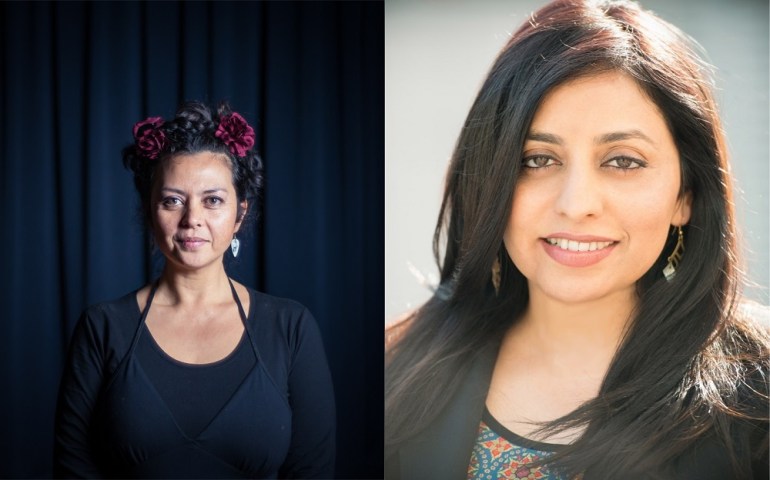Katrina Irawati Graham and Ana Tiwary.
A key focus for Women in Film & Television (WIFT) Australia this year will be expanding its current programs, each of which addresses the exit and entry points for all women and non-binary people in the screen industry.
Another priority for the organisation is looking for ways to increase female and non-binary screen practitioners’ fiscal longevity and sustainability, WIFT Australia chair Katrina Irawati Graham tells IF.
“If anyone wants to support us in this then give us a call. We are in this for the long game,” says Graham.
On her own initiative producer Ana Tiwary, a WIFT Australia board member, is creating an action plan for diversity and inclusion to share with the screen industry.
“Most screen industry organisations and guilds understand the importance of inclusion and some have put together guidelines but there is a need for a simple action list that is easy to follow and implement,” says Tiwary, who is producing Rhapsody of Love, director Joy Hopwood’s Asian-Australian rom-com.
“I am preparing this practical document with input from practitioners who have been working for this cause for many years. The aim is to ensure that our industry is not failing those who have great potential and yet are marginalised.”
Since late last year WIFT Australia has chaired an informal gender equality alliance representing 25 organisations. “We have always believed there is power in community and that we are stronger together,” says Graham.
Among WIFT Australia’s programs, applications will open soon for MentorHer following the success of the three months program in which more than 130 women from across the nation were matched with mentors.
The Raising Films Forum will issue a call to action in the next few months, based on feedback from parents and carer practitioners as well as best-practice consultation from the Raising Films advisory board.
A WIFT Women of Colour sub-committee has been formed to tackle the issues that affect practitioners who are women of colour.
The ScreenMATE bystander training program aims to create cultural change at a grassroots level by empowering participants to champion gender equality.
“Sexual harassment and discrimination stem from the same key drivers of wider inequity, inequality and disparity,” Graham says.
“This includes rigid gender stereotypes and power inequality in the spaces of gender, ethnicity, ability, sexuality and class. Our work in the industry is about raising the level of nuance within the conversation and ensuring there is shared language and shared knowledge so we can act together to create new experiences, systems and cultural norms.
“We are not afraid to challenge injustice and under-representation where we see it. We acknowledge the hard work by so many in our industry, including many women, often in volunteer capacity with few resources, towards gender equality.”
Tiwary calls for “serious funding” to support women feature directors and, within that category, ensuring that women of colour, LGBTQI and women with disability are not excluded.
“Progress has been glacial, especially in changing attitudes towards inclusion,” she says. “Many still believe that merit and diversity are mutually exclusive, so there is resistance to change. A lot of education and unconscious bias training needs to happen before any meaningful improvement can be expected.”
She suggests state funding bodies could run a special initiative to support women feature directors, especially creating opportunities on high-budget projects. “Women and especially women of colour are forever seen as emerging and not experienced enough to work with big budgets,” Ana says. “This perception is sexist/racist and needs to go.”
Tiwary hopes the government’s review of local content rules will result in quotas that provide equal opportunities for all Australian content creators regardless of class, gender, race, age and disability.
Diana Burnett.
Diana Burnett, executive director of the Australian Directors Guild, is keen to see local content quotas extended across all platforms, reasoning: “Without regulation, more international productions will continue to be made here, taking Australian jobs.
“While this may have provisional benefits for some crew, cast and producers, the creative voices of directors and writers are the ones who will disappear as a result of this lack of regulation. It is vital to our cultural identity and its long term sustainability that diverse Australian stories continue to be told.”
After taking over from Kingston Anderson, Burnett’s agenda this year includes finessing targeted professional practice events for 2020 and continuing to provide opportunities for women, under-represented and emerging directors.
Across the industry the ADG will aim to further facilitate a cross collaboration of events and networking opportunities with writers, producers and heads of department.
“The more we can work together in this changing and challenging world, the better it will be for all Australian screen creatives,” she says.
Like some other guilds, the ADG advocates flexible windows for theatrical releases to ensure Australian directors’ work can reach the widest possible audience.
Burnett also calls for extra incentives for productions that are eligible for the Producer Offset where key creatives – directors, writers and producers – are all Australian.



